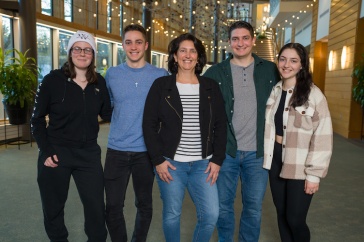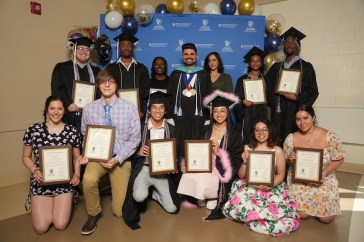
She gets it from her mother, who got it from her mother, who got it from her mother who, yes, got it from her mother. Count them: five generations of music teachers passing on the love.
Noseworthy’s classroom at the Valley View Community School in Farmington, N.H., is full of instruments: a guitar, a piano, multiple barred instruments (xylophones, metallophones and glockenspiels), tambourines and homemade drums fashioned from empty gallon paint cans. Real drumsticks.
 |
| This profile is part of our 10 Under 30 series. See more of this series. |
The middle of the classroom floor is marked with long strips of colored tape that form a musical staff. Students (the school serves kindergarten through third grade) come up and toss beanbags on the lines and then tell Noseworthy what note they’ve hit. Lined cookie sheets and magnets used to represent the notes act as a similar assessment tool.
Noseworthy uses a parachute to demonstrate musical form — changes that happen in a piece of music — and creates activities from children's books, singing about a particular event and using instruments to narrate the characters.
Her mother, Susan Noseworthy, has taught music at the Lincoln Street School in Exeter for more than 30 years. She is an adjunct professor at UNH and the choir director at the family’s church, a job she took over from her mother.
“My mother is the most passionate, energetic person about music that I know. Seeing that as a kid, I just ate it up,” Noseworthy says. “I thought, ‘Wow, I didn’t know a job could be so much fun.’”
She began playing the violin when she was 7 years old after seeing the instrument for the first time during a visit to her mother’s classroom.
“I said I’d like to try it, and the following day she brought one home. By the next week, I was signed up for lessons,” Noseworthy says. “Sticking with it has been a love-hate thing. It became the one thing I couldn’t let go.”
Two years after she started playing, Noseworthy joined the community orchestra. Then, while a student at Newmarket High School, she played with the Phillips Exeter Academy orchestra. From seventh through 12th grade, she attended the Summer Youth Music School (SYMS) at UNH. All of her school friends were athletes. Attending SYMS, she says, changed her life.
“It opened my eyes. At SYMS I found people who had the same interests. I wasn’t the only one who loved music,” she says, adding that some of her closest friends today are people she met during those summer camps.
When she was a senior in college, knowing she wanted to teach elementary school, Noseworthy decided to learn to play the guitar so she could accompany her future students while they were singing. She only learned the piano because UNH requires two years of instruction for all music majors. “I’m so glad for that,” she says.
At the Valley View School, Noseworthy starts Friday mornings by playing the violin or guitar for her students. If she plays a piece of music the children haven’t heard before, most of them will look around to see the reactions of others. By the second time she plays it, they have scarves in their hands and are moving to the beat.
“I can tell when the kids understand the rhythm. Some of them move slower; I can see they are actively listening,” the Newmarket native says. “Then they start swaying or dancing. I love watching the different ways they express themselves.”
She also loves to hear them sing.
“We sing every day, in every class period. Sometimes we sing our attendance,” says Noseworthy, who spent a semester with the UNH choir.
She sees it as her job to help students find their way to music, however that may translate. They can sing, or play an instrument or simply listen and find what she finds, and that is, “Peace and joy,” she says. “I hope that I can open their eyes to what music can offer.”
With the kindergarteners, it’s all about the beat. First graders learn to read basic rhythm patterns. Second graders are taught to read, speak and perform musical patterns. By the time they finish third grade, students are expected to understand music vocabulary and be able to read and perform music on the treble clef.
As a student at UNH, Noseworthy says that while she was musical, she wasn’t very music knowledgeable. Playing wasn’t the same as knowing theory.
“It took many office hours, many tutors to get me through, but I knew I didn’t want to give up,” she says. “And now, here I am; I made it. I feel really lucky. I’m living the dream.”
Related:
UNH Department of Music



















































